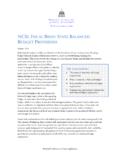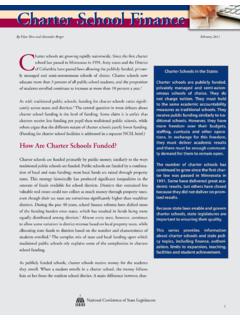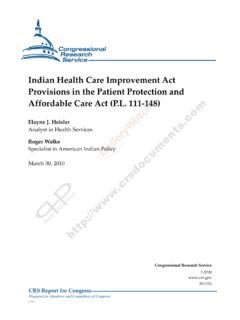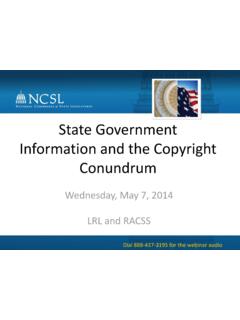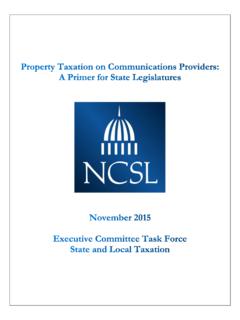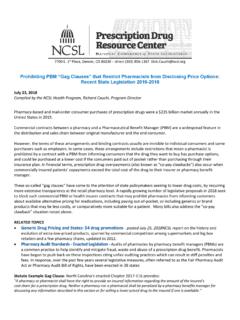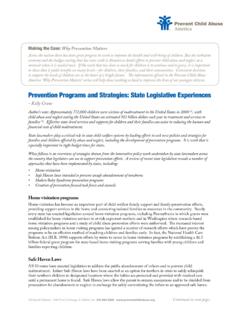Transcription of COMMITTEE: COMMUNICATIONS, FINANCIAL SERVICES …
1 COMMITTEE: COMMUNICATIONS, FINANCIAL SERVICES AND 1 INTERSTATE COMMERCE 2 3 POLICY: banking & FINANCIAL SERVICES 4 5 TYPE: EXISTING POLICY DIRECTIVE 6 STATE SOVEREIGNTY IN FINANCIAL SERVICES 7 The national conference of State legislatures (NCSL) is concerned that Congress, the 8 federal FINANCIAL SERVICES regulators, and the federal courts have sought to nationalize 9 control of FINANCIAL SERVICES in Washington, NCSL has consistently and strongly 10 advocated for state sovereignty in FINANCIAL SERVICES regulation. NCSL has opposed any 11 federal preemption of state legislative or regulatory authority in FINANCIAL SERVICES . A high 12 burden of proof that federal action is necessary, such as a national FINANCIAL crisis, 13 should be met before any preemption of state FINANCIAL SERVICES laws and regulations is 14 warranted.
2 15 16 Preservation of Dual banking System 17 NCSL is committed to the preservation of the dual banking system. The dual system 18 enables state governments to apply laws and regulations to banks and thrifts that serve 19 the needs of local economies and that respond to the values and concerns of local 20 citizens. In recognition of the advantages of the dual system to the public and to the 21 health of the FINANCIAL SERVICES industry, NCSL opposes any efforts by the federal 22 government to restrict state authority to charter, supervise, or regulate the powers of 23 state chartered banks and thrifts. NCSL opposes any federal attempts to tax state 24 banks for federal oversight SERVICES already performed by the appropriate state banking 25 agencies and departments. Nonetheless, NCSL recognizes that the states have a duty 26 to use their powers responsibly and in a way that does not endanger the deposit 27 insurance system and thereby the nation's FINANCIAL stability.
3 NCSL acknowledges 28 congressional efforts in the Dodd-Frank Wall Street Reform and Consumer Protection 29 Act (Dodd-Frank) to limit the unchecked preemption efforts by the Office of the 30 Comptroller of the Currency (OCC) of state FINANCIAL consumer protections. NCSL urges 31 continued congressional vigilance of the OCC and asks the secretary of the Treasury to 32 ensure that the spirit of the Dodd-Frank Act in ensuring the states role in protecting 33 consumers is not diminished in regulations establishing the new Consumer FINANCIAL 34 Protection Bureau. 35 36 Federal Regulatory Consolidation 37 NCSL recognizes the need for the federal government to reduce the federal regulatory 38 burden that can impede the economic vitality of our nation's FINANCIAL SERVICES 39 industries.
4 In consolidating the federal banking regulators, Congress must ensure that 40 any consolidation does not invalidate the regulatory independence of the dual banking 41 system. 42 NCSL opposes any federal regulatory consolidation plan that would: 43 Preempt, limit or interfere with the rights of states to regulate state chartered banks; 44 Require federal reporting requirements and examinations that duplicate state 45 efforts; 46 Place state chartered banks at a competitive disadvantage with national banks or 47 federal thrifts; and 48 Grant oversight authority for state chartered banks to the OCC, the regulator of 49 national banks. 50 NCSL supports the continued federal oversight by the FDIC and the Federal Reserve of 51 state chartered banks. It would be detrimental to the well-being of the dual banking 52 system for Congress to tamper with present oversight cooperation between state 53 banking departments, the FDIC and the Federal Reserve.
5 54 55 Federal Preemption 56 NCSL strongly believes that a high burden of proof must be established before federal 57 preemption of state banking authority is ever justified and that only Congress and not 58 federal regulatory agencies can preempt the actions of elected state leaders. NCSL 59 supports the prevent or significantly interfere with standard established by the 60 Supreme Court and reiterated in Subtitle D of Title X of the Dodd-Frank Act to govern 61 federal preemption of state laws as those laws apply to national banks. NCSL strongly 62 opposes any effort by the OCC to assert its regulatory authority to weaken the standard 63 of preemption or shield national banks and bank operating subsidiaries from state 64 consumer protection laws and enforcement. Moreover, NCSL encourages Congress to 65 eliminate the judicial deference given to the OCC by federal courts in challenges to 66 state FINANCIAL SERVICES laws and to restrain OCC abuse of its regulatory authority to 67 preempt state laws.
6 68 69 Dual Chartering of Credit Unions 70 NCSL believes that state credit union supervisors have the primary responsibility for 71 assuring the safety and soundness of credit unions chartered by and operating under 72 state law and regulation. NCSL supports the authority of state governments to 73 determine how state FINANCIAL institutions must be insured and opposes any efforts by 74 the federal government to preempt states authority to govern state deposit insurance 75 requirements. NCSL also acknowledges that states have a responsibility to provide a 76 credible regulatory environment where powers can be exercised in a way that does not 77 endanger the FINANCIAL solvency of the national Credit Union Share Insurance Fund 78 (NCUSIF). NCSL additionally acknowledges that federal deposit insurance agencies, 79 like the national Credit Union Administration (NCUA), have a legitimate role to play if 80 state authorized powers lead to unreasonable risks for NCUSIF.
7 However, NCUA 81 regulations and policies should be crafted in a way that minimizes the preemption of 82 state authority. NCSL opposes any effort by the Administration and Congress to erode 83 the dual chartering system for credit unions by preempting state credit union laws and 84 regulations that do not adversely impact the FINANCIAL well-being of state chartered credit 85 unions and thus the NCUSIF. Any preemption of state credit union laws or regulatory 86 authority must be justified only by a clear and certain threat to the credit unions' share 87 insurance fund by those credit unions that are federally insured. 88 89 Consumer Protection 90 State legislatures and Congress must periodically consider legislation: to ensure 91 consumer access to basic FINANCIAL SERVICES ; to protect the privacy of FINANCIAL 92 consumers and the security of their personal FINANCIAL information; to provide protection 93 for consumers from abusive lending practices; to ensure disclosure of information about 94 credit terms, interest rates, fees, and balances; to regulate branch closing; and to 95 otherwise protect the consuming public.
8 In recognition that this is an area of overlapping 96 federal and state jurisdiction, NCSL will ordinarily not oppose such federal consumer 97 protection measures, provided that there is no preemption of complementary state 98 consumer protection legislation. Federal legislation should not prohibit state legislatures 99 and state regulators from providing additional protections for consumers of FINANCIAL 100 SERVICES . Furthermore, as the Consumer FINANCIAL Protection Bureau established in 101 Dodd-Frank commences its role as the federal agency responsible for regulating 102 consumer protection and enforcing applicable federal laws NCSL opposes any action 103 that preempts state consumer protections law or undermines the principles of 104 federalism. 105 106 Finally, as online FINANCIAL SERVICES continue to grow, clear rules must be established as 107 to which jurisdiction's consumer protections apply to a given transaction.
9 NCSL believes 108 that any such rules should be crafted through a partnership between state and federal 109 regulators and should not place state chartered FINANCIAL institutions at a disadvantage 110 in the institution s ability to provide SERVICES over the Internet. 111 112 FINANCIAL SERVICES and Economic Development 113 NCSL recognizes that racial, ethnic, or gender discrimination by FINANCIAL SERVICES 114 institutions may have an impact on the ability of residents in distressed communities to 115 obtain FINANCIAL assistance. State legislators also recognize the need for FINANCIAL 116 institutions to make safe, sound and profitable investments. NCSL, recognizing the 117 responsibilities that each state has for FINANCIAL institution regulation and solvency and 118 for providing for fair lending to their constituents, believes that each state legislature has 119 the responsibility to address the unique needs of its state.
10 Likewise, the federal 120 government as regulator of federal FINANCIAL institutions must make the same 121 determinations and act accordingly. However, Congress must not mandate federal 122 guidelines that impede the states ' abilities to regulate FINANCIAL SERVICES . 123 124 Securities Regulation 125 NCSL recognizes that the federal government has an interest in efficient and fair capital 126 markets. NCSL also acknowledges that the states securities agencies are 127 indispensable partners with their federal counterparts engaging in the pursuit of fair and 128 efficient capital markets by protecting local investors, workers, and communities by 129 ensuring compliance with securities laws. 130 NCSL is concerned that the preemption of state securities laws and regulations will 131 serve only to erode investor trust in the capital markets by further weakening a system 132 designed to protect investors and putting the FINANCIAL well-being of hard-working 133 Americans at risk.
